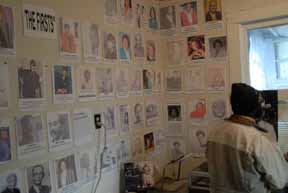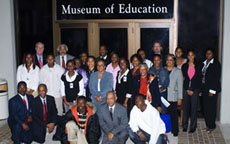

|
|||||||||||||||
| “I am happy to have come along in that era and experienced those many wonderful activities at I. M. Terrell. We learned much at the school and experienced a great deal. We are all very proud of our school.” Robert L. O’Neal |
|||||||||||||||
I too am so happy to have visited Fort Worth (my first visit to Texas) and to meet those alumni who have allowed me to learn and experience “a great deal,” just as Robert O’Neal has said. Long before my arrival, much work had been completed by the I. M. Terrell High School Alumni Association’s president and vice president, James Mallard and Beverly J. Washington. I greatly appreciate their efforts to provide names of potential interviewees and to suggest that our oral history interviews be held in the Ella Mae Shamblee branch of the Fort Worth Public Library, a setting that was lovely as Terrell students arrived for our group discussions and as I worked with Margie Major scanning Terrell documents. |
|||||||||||||||
 Hazel Harvey Peace placque at the Evans Avenue Pavillion |
|||||||||||||||
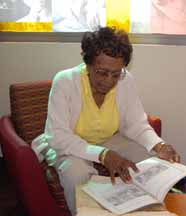 examining materials with Margie Major |
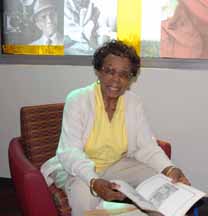 before our scanning session |
||||||||||||||
My visit to Texas was especially notable as I so enjoyed walking along the Evans Avenue Pavilion and, thanks to Opal Lee, visiting the Juneteenth Museum where I met Donald Williams. And while visiting Fort Worth, I was even introduced to an idiosyncratic culinary phenomena—the barbequing of beef. As a South Carolinian, I had heard of this practice and now believe there is some merit to this type of food preparation. I must admit, however, that I took great joy in sending to Mr. Mallard and the Terrell High School Alumni Association a few bottles of our delicacy— mustard-based barbeque sauce which, as we all know, is to be served on pulled pork! |
|||||||||||||||
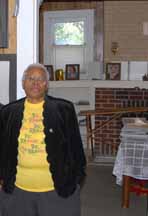 with Opal Lee at the Juneteenth Museum |
|
||||||||||||||
I hope this web exhibition will cause patrons to reconsider the important- yet- overlooked heritage of African American secondary school education prior to the Briggs v Elliot case, to acknowledge the true injustices of a “separate and allegedly equal” educational system, to appreciate the importance of preserving the memory of these courageous schools that forged strong educational programs within segregated communities, and to recognize a spirit of progressive education that embraced “democracy as a way of life” in a struggle for civil rights and social justice. Craig Kridel |
|||||||||||||||

an institutional member of the International Coalition of Sites of Conscience
curator@museumofeducation.info

